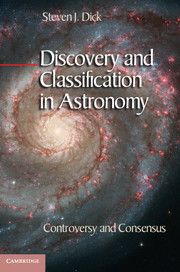Book contents
- Frontmatter
- Contents
- Preface
- Abbreviations
- Introduction The Natural History of the Heavens and the Natural History of Discovery
- Part I Entrée
- Part II Narratives of Discovery
- Part III Patterns of Discovery
- Part IV Drivers of Discovery
- Part V The Synthesis of Discovery
- 10 Luxuriant Gardens and the Master Narrative
- 11 The Meaning of Discovery
- Appendix 1 Astronomy’s Three Kingdoms
- Appendix 2 Astronomical Discoveries and Their Extended Structure
- Notes
- Select Bibliographical Essay
- Glossary of Concepts Related to Discovery
- Index
11 - The Meaning of Discovery
from Part V - The Synthesis of Discovery
Published online by Cambridge University Press: 05 August 2013
- Frontmatter
- Contents
- Preface
- Abbreviations
- Introduction The Natural History of the Heavens and the Natural History of Discovery
- Part I Entrée
- Part II Narratives of Discovery
- Part III Patterns of Discovery
- Part IV Drivers of Discovery
- Part V The Synthesis of Discovery
- 10 Luxuriant Gardens and the Master Narrative
- 11 The Meaning of Discovery
- Appendix 1 Astronomy’s Three Kingdoms
- Appendix 2 Astronomical Discoveries and Their Extended Structure
- Notes
- Select Bibliographical Essay
- Glossary of Concepts Related to Discovery
- Index
Summary
It would have been fairer, and would send a less distorted message about how this kind of science is actually done, if the [Nobel] award had been made collectively to all members of the two groups [for the discovery of the accelerating universe].
Martin Rees, 2012Agreeing on what constitutes discovery and assessing the process by which discovery occurs and is accepted are an integral part of accelerating discovery.
Robert WilliamsThe Natural History of Discovery
Our natural history of discovery in this volume, analogous to the natural history of the heavens that astronomers have undertaken over the last 400 years, has uncovered some surprising conclusions. Focusing on new classes of astronomical objects – defined in our study by those eighty-two objects listed in Appendices 1 and 2 and as discussed in Chapter 8 – we have found that the discovery of virtually every class of object displays an extended structure. Thomas Kuhn and others foreshadowed such a structure already fifty years ago, but unlike Kuhn’s anatomy of discovery, which involved anomaly, paradigms, a distinction between normal and revolutionary science, and a subordination of discovery to the concept of revolutions, we place discovery at center stage in science. We find a macrostructure consisting most often of detection, interpretation, and understanding, and a microstructure involving not only the nuanced problems of those three stages and their conceptual content, but also social and technical elements.
- Type
- Chapter
- Information
- Discovery and Classification in AstronomyControversy and Consensus, pp. 329 - 342Publisher: Cambridge University PressPrint publication year: 2013



